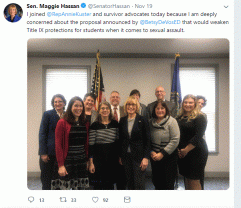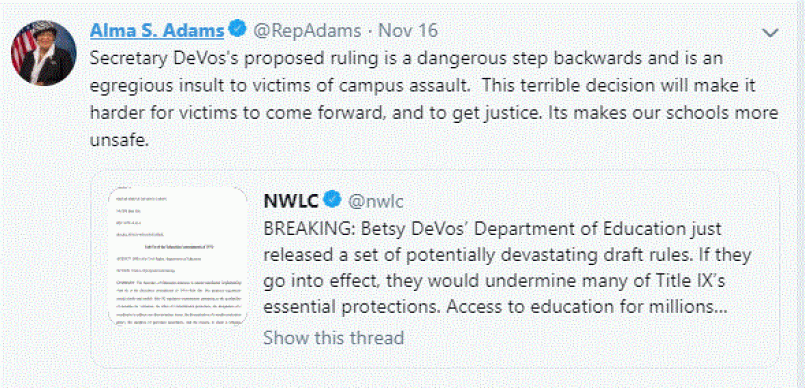When Betsy DeVos delivered her September 2017 George Mason speech, championing fair treatment for both sides, many Democratic legislators criticized her; none defended the idea of campus due process.
When DeVos rescinded the guilt-tilting Obama-era guidance in September 2017, many Democratic senators criticized her; none defended the idea of campus due process.
So it’s probably not surprising that the new proposed Title IX regulations generated exclusively negative commentary from congressional Democrats.
Eleven Democratic senators (including Senator-elect Jacky Rosen) criticized the proposed regulations, often in inflammatory terms, while rarely providing specifics.
For instance, Dianne Feinstein: the longtime California senator claimed (without saying how) the proposed regulations would “silence victims,” and “drown out the voices of victims in favor of their accusers.” (It appears that she meant to end her statement with: “the students they accuse.”)
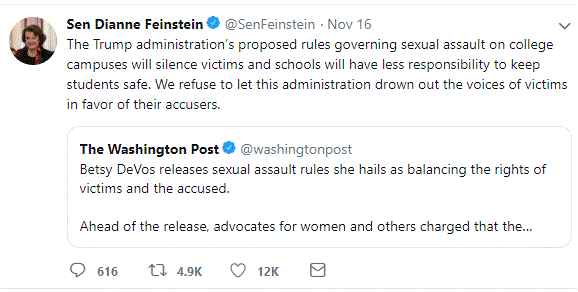
Ron Wyden claimed that that regulations would be “stifling” rather than “empowering survivors.” Jeanne Shaheen claimed that the proposed regulations would discourage survivors of sexual assault from reporting the crimes against them, but did not explain why.
Patty Murray (unsurprisingly) was opposed. So too were similarly ardent foes of any type of fair treatment for accused students, Bob Casey and Kirsten Gillibrand.
Bob Menendez’s hostility to fairer treatment for accused students was particularly notable given how the New Jersey senator benefited from the due process given to the accused in his corruption trial.

Other Senate critics of the regulations included Maggie Hassan, Jacky Rosen, Mark Warner, and Richard Blumenthal.
Not a single Senate Democrat mentioned the importance of due process, the presumption of innocence, or the need to ensure that both sides had full access to evidence in Title IX adjudications. Only one—Wyden—pointed to cross-examination, in the context of suggesting the procedure was a bad thing.
In the House, likely Speaker Nancy Pelosi issued an extraordinary statement, attacking the regulations as a document that “denies survivors due process.” Does the incoming Speaker believe that accusers (but not the accused) have a due process right not to be cross-examined? To ensure that the student they accused can’t see all the evidence? All training material? That it’s a violation of an accuser’s due process rights to presume the accused student innocent? She didn’t say. Pelosi promised to “fight this cruel agenda.”
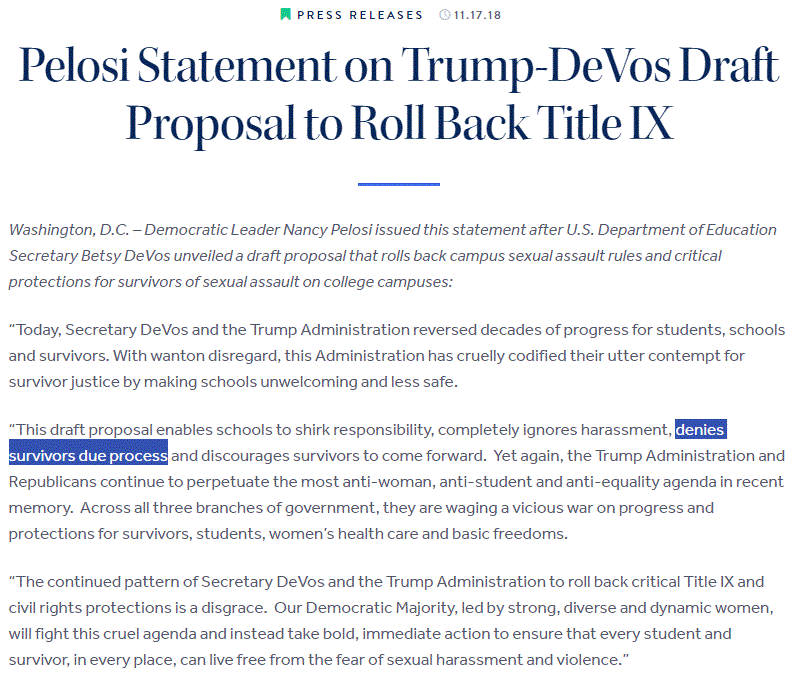
Rep. Raul Grijalva, among the most liberal members of the House, asserted that the due process provisions were “making it easier to protect the perpetrators.”
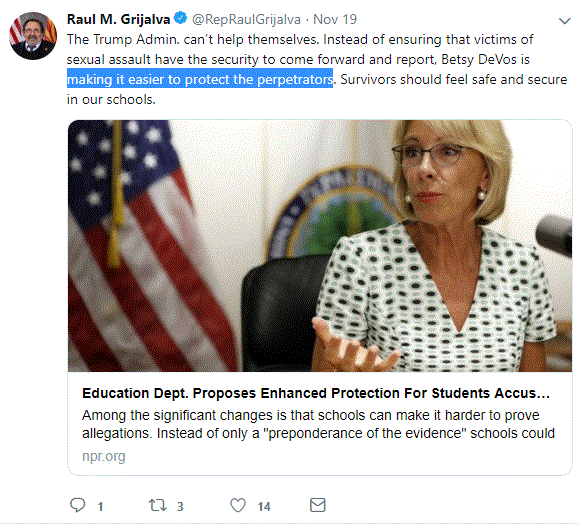
Rep. Jackie Speier—who previously seemed to challenge the need for Title IX tribunals to recognize the presumption of innocence—deemed herself “disgusted,” and labeled DeVos “a shill for Trump Admin’s slash & burn agenda to gut protections for sexual violence survivors.” She did not explain which provisions of the regulations made her feel this way.

According to Rep. Rosa DeLauro (D-Connecticut), the draft regulations showed how “Betsy DeVos is on the side of those accused rather than the victims.” She did not explain how she reached this conclusion.

When Rep. Joe Kennedy (D-Massachusetts) falsely asserted the regulations would have the accused cross-examining the accuser, he received a correction from the Education Department. Rather than acknowledge his error, he offered a stat implying that the number of campus sexual assaults had risen since the implementation of the Obama policies.
To Rep. Ann Kuster (D-New Hampshire), regulations allowing cross-examination and full access to evidence would “make campuses less safe for all students.” She did not explain how. A handful of other Democratic House members also criticized the proposed regulations.
Two statements, however, stood out. The first came from incoming Education and Labor Committee chair Bobby Scott (D-Virginia). He strongly attacked the proposed regulations. But he did also say, “Institutions must secure due process for the accused.” As far as I know, this throwaway clause represented the first remarks from a Democratic legislator since DeVos took office to even purport to favor due process for accused students.
Then there was public criticism from a Republican officeholder—New Hampshire governor Chris Sununu. In his letter, Sununu built his argument for setting aside the new regulations in part because “we know that 1 in 4 women and 1 in 10 men will be sexually assaulted in college.” It’s not clear how Sununu knows this—even the Obama administration had never offered a 1-in-4 stat for female undergraduates or a 1-in-10 stat for male undergraduates. (Does Sununu believe that the Obama-era policies were so ineffective as to make sexual assault more frequent in the last three years?) In the event, if Sununu really believes that thousands of college students annually are victims of violent crime in low-crime New Hampshire, you’d think he’d have boosted the state police presence on college campuses.
There’s no evidence that he has done so.






